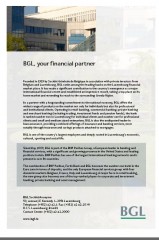07/17/2009
Alfi News Digest: telling censorship on the depositary issue
Early July, the European Commission has launched a wide-ranging public consultation on the UCITS depositary Function. This consultation will play an important role in identifying and shaping the European response to vulnerabilities emanating from the UCITS depositary sector, with a view to improving the level of protection for UCITS investors. Commissioner Charlie McCreevy said: "The Madoff fraud has revealed that the requirements of the UCITS Directive have been transposed in very diverging ways creating an unlevel playing field in the protection of retail investors.
Why on earth is the information not circulated by the ALFI, which is the first concerned. It was circulated by the ABBL.
The last issue of the Alfi News Digest was created on 13 July 2009 : it ignores the Consultation Paper on the depositary. Neither the keyword "depositary" nor the keyword "custodian" are quoted.
I am afraid such censorship on the issue demonstrate that professionals that are upset because they fooled the investors on the so-called "faithful" transposition of the UCITS directive.
They are responsible as the ALFI actually created and supported the conditions that opened the drift.
Let's have a look on two documents that are available on their website.
Let's have a look on what stated Rafik Fischer, Vice Chairman ALFI, in 2005 for Fundlook in an article titled "Shaping the Regulatory Environment" : "The relationship between the Luxembourg Commission de Surveillance du Secteur Financier Luxembourg ( CSSF ) and the Financial centre it supervises has always been described, and rightly so, as being heavily influenced by a true common interest approach. (...) The Luxembourg Investment Fund Industry has regularly had a very close and direct say on the evolution of the Luxembourg prudential regulatory environment governing the collective Investment Industry. (...) This influence has been exerted directly and indirectly by the lobbying initiatives taken on the level of the different professional associations, be it ALFI or ABBL , but also and more importantly, trough a direct association with the Luxembourg Supervisory Authorities by means of a number of standing committees (...) It is in those Committees which have proven instrumental in launching new legislative initiatives like the International Pension Funds or the SICAR ( société d’investissement en capital à risque ) and providing pragmatic and timely solutions to the evolution of the industry"
In other words, the ALFI admitted its influence on the CSSF and that it decides the Luxembourg prudential regulatory environment to be enforced. Quod Erat Demonstrandum.
Let's have a look on a flyer. It is written "All asset management activities must be approved by the Commission de Surveillance du Secteur Financier (CSSF), the financial services supervisory body which carries out an effective and pragmatic supervision of the financial sector."
What is a pragmatic supervision, knowing that the influence on the financial services supervisory body is admitted? Luxembourg is a strange regulated center where professionals decide what is to be done.
What was observed for the transposition of the UCITS directive and the misleading communication on the so-called "faithful" transposition is true as well for AML, tax evasion, corruption and any other sensitive question in this secrecy jurisdiction where those who call for an ethical approach are excluded (as an OECD report observed: "There would seem to be very little likelihood in Luxembourg that a company employee who has been witness to misappropriation of funds will report this to the authorities. According to the union representatives interviewed by the examining team, the main reason for this is the country’s small size: everything becomes known very quickly, and so anyone who reports an offence will soon find himself labelled as an informant and excluded from the labour market") as there was one rule that has exploded in their face: business over ethics.
I will quote again what I wrote at the begining of this blog :
Authorities must ask questions and accept questions especially on compliance issues. They must tighten up the ship on issues all the more than there are alternative financial centers for investors and head offices of banks. Otherwise they weaken their international credibility.
The failure to ask or to answer questions allows these authorities (either political or professional) to operate with a distorted sense of reality. In fact, Finkelstein calls companies that are unable to question their prevailing view of reality zombies. A zombie company, he says, is “a walking corpse that just doesn’t yet know that it’s dead—because this company has created an insulated culture that systematically excludes any information that could contradict its reigning picture of reality”.
This is true as well for a financial center.
18:39 Posted in Luxembourg | Permalink | Comments (0)
When the audited advertises in its auditor’s publication in a jurisdiction where auditors may influence law and regulation to bypass their Code of Ethics
KPMG Luxembourg has just co-published with the Luxemburger Wort an interesting study about the banking sector in Luxembourg: Luxembourg Banks Insights 2009.
I will analyse the brochure by the end of the week to provide my feeling on it.
But there is something that is worrying for auditors.
The first page of the brochure is an actual Ad for BGL, which is a KPMG client (see BGL reports). Another big bank – Dexia – advertises as well but its auditor is Deloitte and the issue is less important than the case of the audited that advertises in its auditor’s publication.
BGL should not have advertised in this brochure and KPMG should not have published such Ad.
In my opinion, an auditor is not supposed to publish an Ad for its audited as this is a support to the marketing and sales of its client, which is definitely not the auditor’s role: such situation may impair the auditor’s independent opinion.
But is is true that this story occurs in Luxembourg, the small place where everybody knows everyone and where auditors have a Code of Ethics that states something that means that Luxembourg law and regulation may bypass the auditors’ ethical rules: If a professional is prohibited from complying with certain parts of this Code of Ethics (volume 1 & 2) by law or regulation, they should comply with all other parts of this Code of Ethics. In such case, departure from the Code of Ethics shall be properly documented in the engagement file.
This situation is actually allowed by the IFAC: its Code of Ethics for Professional Accountants (version 2005 and 2009) specifies that if a member body or firm is prohibited from complying with certain parts of this Code by law or regulation, they should comply with all other parts of this Code. To be honest the Code of Ethics as adopted in Luxembourg adds that departure from the Code of Ethics shall be properly documented in the engagement file, which is a good thing.
But such flexibility is dangerous in a small jurisdiction like Luxembourg where there is a strong influence of the business on law and regulation and where there are many conflicts of interest because of the small size.
There are actually two situations that can be met in the Luxembourg legal and regulatory framework
1. Law or regulation may allow situations that do not comply with the Code of Ethics (e.g. conflicts of interests) and auditors do not have to abide by the code because of this law or regulation.
2. Law or regulation may allow exemptions for the auditors not to abide by their Code of Ethics.


17:45 Posted in Luxembourg | Permalink | Comments (0)
07/16/2009
Launch of a new association for the promotion of transparency in Luxembourg (update)
Three lawyers and a reviseur d’entreprise (registered auditor) has recently created a new association for the promotion of transparency in Luxembourg.
1) Serge Marx, lawyer,
2) Marguerite Ries, lawyer
3) Stephen Nye, réviseur d'entreprise
4) Yann Baden, lawyer
I welcome the initiative but none of them have any expertise or background in the fight of corruption situations (a Google search with the name, the word corruption and .lu only finds the registration of the Association.)
The association was launched before the release of the fifth annual Progress Report on Enforcement of the OECD Convention prepared by Transparency International where there are no data for Luxembourg.
They aim to:
a) promote transparency and integrity in public life
b) inform on the phenomenon of corruption and means to reduce the phenomenon
c) collaborate with associations that have similar goals to achieve them
I will contact them
18:32 Posted in Luxembourg | Permalink | Comments (0)






